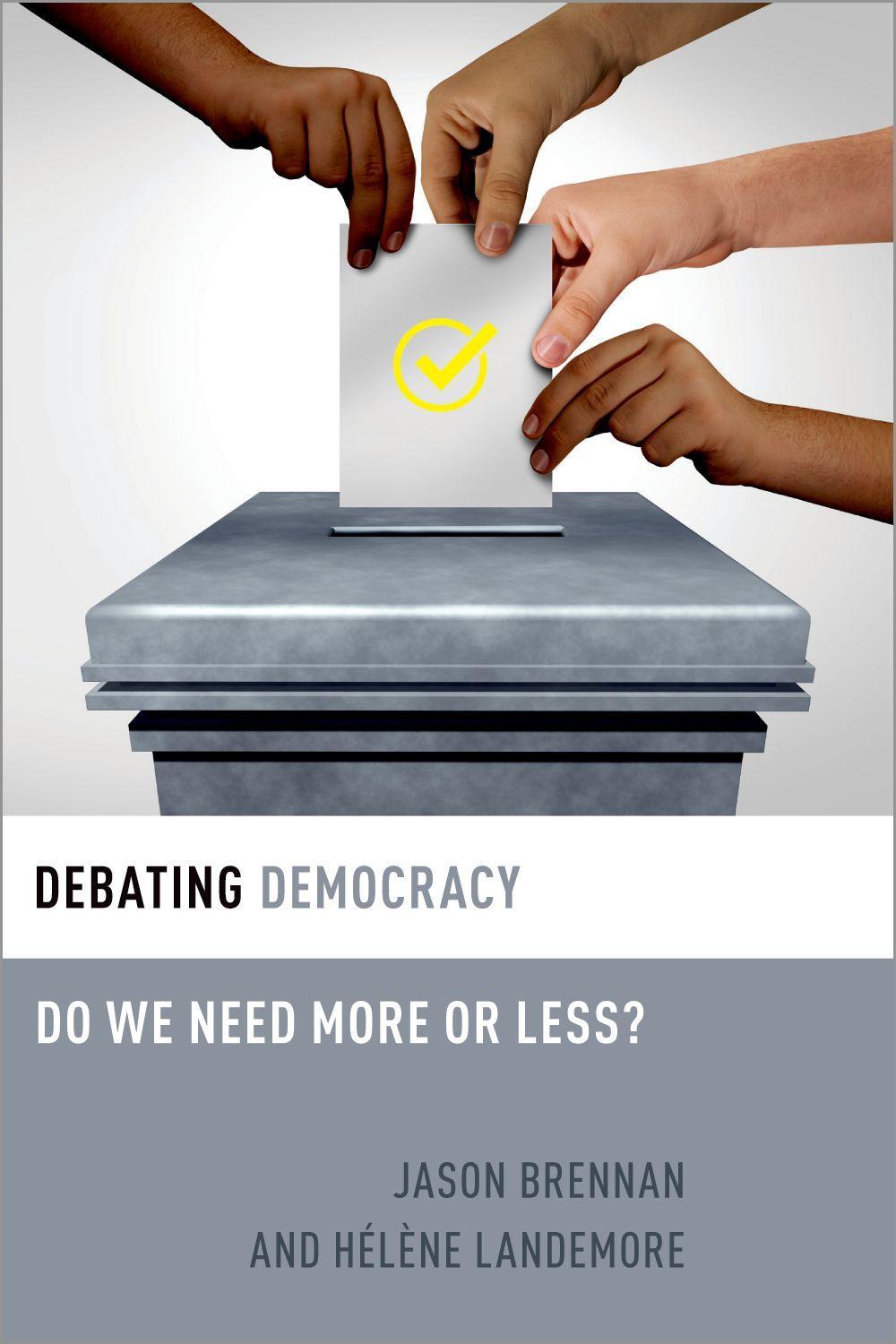
When you click on links to various merchants on this site and make a purchase, this can result in this site earning a commission. Affiliate programs and affiliations include, but are not limited to, the eBay Partner Network.
Debating Democracy: Do We Need More or Less? by Jason Brennan (English) Paperbac

- Item No : 365653115919
- Condition : Brand New
- Brand : No brand Info
- Seller : the_nile_uk_store
- Current Bid : US $48.24
-
* Item Description
-
The Nile on eBay

Debating Democracy
by Jason Brennan, Hélène Landemore
Around the world, faith in democracy is falling. Russia, Turkey, and Venezuela have moved from flawed democracies to authoritarian regimes. Brexit and the rise of far-right parties show that even stable Western democracies are struggling. Partisanship and mutual distrust are increasing. What, if anything, should we do about these problems? In this accessible work, leading philosophers Jason Brennan and Hélène Landemore debate whether the solution liesin having less democracy or more. Brennan argues that democracy has systematic flaws, and that democracy does not and cannot work the way most of us commonly assume. He argues the best solutionis to limit democracy's scope and to experiment with certain voting systems that can overcome democracy's problems. Landemore argues that democracy, defined as a regime that distributes power equally and inclusively, is a better way to generate good governance than oligarchies of knowledge. To her, the crisis of "representative democracy" comes in large part from its glaring democratic deficits. The solution is not just more democracy, but a better kind, which Landemoretheorizes as "open democracy."
FORMAT
PaperbackLANGUAGE
EnglishCONDITION
Brand New
Table of Contents
IntroductionPart I: Brennan - Democracy without RomanceChapter 1. How Real Democracy Really WorksChapter 2. Is the Solution More Democracy?Chapter 3. Democracy: Less Is MoreChapter 4. Alternatives to DemocracyPart II: Landemore - Let's Try Real DemocracyChapter 5. The Argument for DemocracyChapter 6. ObjectionsChapter 7. Against EpistemocraciesChapter 8. If Democracy Is Such a Smart Regime, Why Are Democracies Doing So Poorly at the Moment and How Can We Fix Them?Part III: Responses by Jason Brennan and Hélène LandemoreChapter 9. A Response to BrennanChapter 10. A Response to Landemore
Review
Brennan, in particular, is quite good at presenting complex ideas in a straightforward, accessible way. He uses examples well to explain the real costs of giving equal power to people with unequal knowledge, as in the case of Brexit. Landemore...presents thought--provoking suggestions, such as the increased use of randomly selected citizen assemblies. Both authors, from their very different perspectives, present intriguing ideas about how people might influence decision--making other than through the representative systems Americans are used to. * J. Heyrman, Berea College, CHOICE *
Could democracy be a mistake? Since it gives an equal vote to the wise and the irrational alike, how well can it really be expected to perform? Couldn't experts do better, and on such momentous matters shouldn't we go for the best? This challenge is traditional, but also currently hot inside and outside academia. As against some others Jason Brennan and Hélène Landemore agree on the problem's fundamental importance, but from there much else is up for debate. As two leading contributors to the lively literature on these questions, Brennan and Landemore deliver a vividly written introduction that will appeal to students, and a cutting-edge debate of importance to scholars as well. * David Estlund, Lombardo Family Professor of Philosophy, Brown University *
The future of democracy is one of the great issues of our time. In Debating Democracy, two of the world's leading experts on the subject debate whether the cure for democracy's ills is more democracy – as Helene Landemore argues – or whether we instead need tighter constraints on the power of democratic majorities, as Jason Brennan contends. Both defend their respective positions with great insight and skill. Scholars and laypeople alike can learn much from this outstanding work. It's hard to imagine a more timely book than this one! * Ilya Somin, Professor of Law, George Mason University *Long Description
Around the world, faith in democracy is falling. Russia, Turkey, and Venezuela have moved from flawed democracies to authoritarian regimes. Brexit and the rise of far-right parties show that even stable Western democracies are struggling. Partisanship and mutual distrust are increasing. What, if anything, should we do about these problems? In this accessible work, leading philosophers Jason Brennan and H
Review Text
"Could democracy be a mistake? Since it gives an equal vote to the wise and the irrational alike, how well can it really be expected to perform? Couldn't experts do better, and on such momentous matters shouldn't we go for the best? This challenge is traditional, but also currently hot inside and outside academia. As against some others Jason Brennan and H
Review Quote
"Could democracy be a mistake? Since it gives an equal vote to the wise and the irrational alike, how well can it really be expected to perform? Couldn't experts do better, and on such momentous matters shouldn't we go for the best? This challenge is traditional, but also currently hot inside and outside academia. As against some others Jason Brennan and H
Feature
Selling point: Summarizes a massive body of empirical work on voter and democratic behavior, helping readers see how their views of justice depend in part on how they think democracy functionsSelling point: Provides an extensive debate on the issue of when and why collective decision-making goes well or goes badlySelling point: Responds to the growing dissatisfaction around the world with democratic politics by offering potential solutionsSelling point: Addresses the technocratic temptation induced by the success of China, Singapore and other technocratic regimes
Details
ISBN0197540821Author Hélène LandemoreShort Title Debating DemocracyLanguage EnglishISBN-10 0197540821ISBN-13 9780197540824Format PaperbackSubtitle Do We Need More or Less?Publisher Oxford University Press IncImprint Oxford University Press IncPlace of Publication New YorkCountry of Publication United StatesYear 2021Publication Date 2021-12-30AU Release Date 2021-12-30NZ Release Date 2021-12-30US Release Date 2021-12-30UK Release Date 2021-12-30Series Debating EthicsAlternative 9780197540817DEWEY 321.8Audience Professional & VocationalPages 298


















